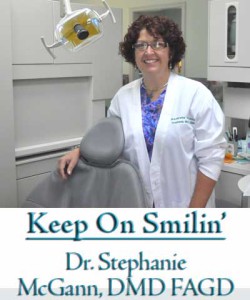Gingivitis connected to increased heart attack, stroke, pregnancy risks
By Dr. Stephanie McGann, DMD FAGD FICD, Columnist, The Times
 Each year more and more research confirms the relationships between serious health concerns and diseases of the mouth. I recently was at a lecture where some of the latest research was reviewed and while the research was aimed at treatment protocols, the message is relevant to us all.
Each year more and more research confirms the relationships between serious health concerns and diseases of the mouth. I recently was at a lecture where some of the latest research was reviewed and while the research was aimed at treatment protocols, the message is relevant to us all.
Cardiologists and physicians are now testing patients for levels of a substance called C-reactive protein. Elevated levels of this compound in the blood indicate an increased risk for heart disease. C-reactive protein (CRP) is formed in the liver as a result of inflammation. It is considered by the New England Journal of Medicine to be a more accurate indicator of heart attack or stroke than high cholesterol. Chronic (long standing) inflammation is responsible for increased levels. For example, a female with increased levels of CRP is four times more likely to develop coronary disease then one with normal levels.
Gingivitis, bleeding gums, is a chronic inflammation. The human body produces C reactive protein as a result of this inflammatory process. Gingival inflammation significantly increases a patient’s risk of developing heart disease, stroke or other serious health issues. Symptoms of gum diseases include, red swollen bleeding gums, gums that bleed when brushing or flossing, tender gums, receding gums, pockets between the teeth and gum, foul odor or loosening teeth.
CRP is also being studied as a marker for pregnant women. Women with elevated C-reactive protein during the first trimester are more likely to develop pre-eclampsia. Other studies have shown that bacteria from the mouth can work their way into the bloodstream in patients with gingivitis or other gum diseases. In a study reported in the Journal of Obstetrics and Gynecology, bacteria from an oral infection can work its way into the amniotic fluid causing harm to the baby. In at least one case DNA testing showed that a baby was stillborn with an infection of the exact same bacteria living in the mother’s mouth.
Men are not off the hook. Study from the National Cancer Institute and the Journal of Periodontology have both established a significant connection between gum disease and inflammation of the prostate. Men with periodontal disease have a 60% higher risk of being diagnosed with prostate cancer than those with healthy gums.
CRP markers are now used to predict serious complications for kidney dialysis patients. Individuals with elevated CRP are considered to be high risk for developing diabetes. The medical community is constantly learning more to combat diseases that impact our lifespan and quality of life. This research is shows that our health is very much interconnected. Left untreated diseases of the mouth can shorten a patient’s life. . Other research has indicated that the DNA of some oral plaque bacteria was found to be present in the plaques that develop in coronary arteries.
How do we treat this? The first step is regular preventive dental visits. Too many Americans just don’t go to the dentist unless something hurts. Once in the office, the dentists and hygienists will evaluate the health of the tissues and recommend a course of action. Depending on the location and severity of the disease many options for care are available. New treatment protocols are being implemented to combat gingivitis, periodontitis and chronic inflammation.
Don’t shrug off gingivitis it’s more than just bleeding gums. Any chronic inflammation, including gingivitis or periodontitis will cause an increase in production of C-reactive protein. This increase is dangerous and can put patients at risk. We now need to take this seriously. When skimping on preventive services it could be life threatening. As a dental provider I will be treating all gum diseases more aggressively. Your dentist should too. So the next time you think about skipping the floss postponing your oral hygiene appointment, think twice. What these studies are showing is that chronic inflammation is dangerous. Ask your dentist or hygienist if you have or are at risk for gingivitis or gum disease.
Dr. Stephanie McGann, who has more than two decades of dental practice experience, is a resident of the Unionville area and along with her partner, Dr. Marie Scott, operates The Brandywine Smile Center, a family-friendly dental practice in Concordville. Dr. McGann has opened a new practice in Valley Township, Rainbow Valley Dental. She is a Fellow of the Academy of General Dentistry.




